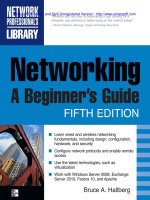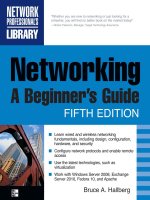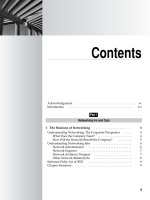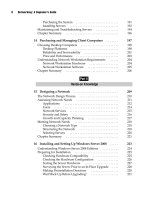Networking: A Beginner’s Guide Fifth Edition- P2 potx
Bạn đang xem bản rút gọn của tài liệu. Xem và tải ngay bản đầy đủ của tài liệu tại đây (135.8 KB, 5 trang )
v
Contents
Acknowledgments xv
Introduction xvi
Part I
Networking Ins and Outs
1 The Business of Networking 3
Understanding Networking: The Corporate Perspective 4
What Does the Company Need? 4
How Will the Network Benefit the Company? 5
Understanding Networking Jobs 6
Network Administrator 6
Network Engineer 7
Network Architect/Designer 7
Other Network-Related Jobs 8
Sarbanes-Oxley Act of 2002 8
Chapter Summary 9
vi
Networking: A Beginner’s Guide
2 Laying the Foundation 11
Bits, Nibbles, and Bytes 12
Understanding Binary Numbers 12
Other Important Numbering Systems 14
Basic Terminology to Describe Networking Speeds 15
Chapter Summary 16
3 Understanding Networking 17
Knowing Network Relationship Types 18
Peer-to-Peer Network Relationships 18
Client/Server Network Relationships 19
Comparing Peer-to-Peer and
Client/Server Networks 20
Learning Network Features 23
File Sharing 23
Printer Sharing 24
Application Services 25
E-mail 25
Remote Access 26
Wide Area Networks 27
Internet and Intranet 27
Network Security 28
Understanding the OSI Networking Model 28
Physical Layer 30
Data-Link Layer 30
Network Layer 30
Transport Layer 31
Session Layer 31
Presentation Layer 31
Application Layer 32
Understanding How Data Travels
Through the OSI Layers 32
Learning About Network Hardware Components 32
Servers 33
Hubs, Routers, and Switches 34
Cabling and Cable Plants 34
Workstation Hardware 36
Chapter Summary 36
4 Understanding Network Cabling 37
Understanding Cable Topologies 38
Bus Topology 39
Star Topology 41
vii
Contents
Ring Topology 44
Comparing Rings to Stars and Buses 46
Demystifying Network Cabling 47
Overview of Basic Cable Types 47
Twisted-Pair Cabling:
The King of Network Cables 48
Coaxial Cable 52
Installing and Maintaining Network Cabling 54
Choosing a Cabling Contractor 54
Solving Cable Problems 55
Chapter Summary 58
5 Home Networking 59
Benefits from Home Networking 60
Choosing a Home Network Technology 61
Standard Network Hardware 61
Phoneline and Powerline Networking Options 62
Wireless Networking 62
Chapter Summary 64
6 Understanding Network Hardware 65
Directing Network Traffic 66
Repeaters 67
Hubs and Concentrators 68
Switches 69
Bridges 71
Routers 72
Gateways 73
Protecting a Network with Firewalls 74
Connecting RS-232 Devices with Short-Haul Modems 75
Chapter Summary 76
7 Making WAN Connections 77
Determining WAN Needs 78
Analyzing Requirements 79
Switched or Dedicated? 79
Private or Public? 81
Comparing WAN Connection Types 81
Plain Old Telephone Service (POTS) 81
Integrated Services Digital Network (ISDN) 82
Digital Subscriber Line (DSL) 83
T-1/T-3 (DS1/DS3) Connections 85
Asynchronous Transfer Mode (ATM) 86
X.25 86
Chapter Summary 87
viii
Networking: A Beginner’s Guide
8 Understanding Networking Protocols 89
Understanding TCP/IP and UDP 90
TCP and UDP Ports 91
IP Packets and IP Addressing 92
IP Subnetting 96
Subnet Masks 96
Understanding Other Internet Protocols 98
Domain Name System (DNS) 98
Dynamic Host Configuration Protocol (DHCP) 100
Hypertext Transfer Protocol (HTTP) 101
File Transfer Protocol (FTP) 101
Network News Transfer Protocol (NNTP) 102
Telnet 102
Simple Mail Transfer Protocol (SMTP) 103
Voice over IP (VoIP) 104
Comparing Important Proprietary Protocols 105
Novell’s IPX/SPX 106
NetBIOS and NetBEUI 106
AppleTalk 107
Chapter Summary 107
9 Exploring Directory Services 109
What Is a Directory Service? 110
Forests, Roots, Trees, and Leaves 112
Department of Redundancy Department 113
Learning About Specific Directory Services 114
eDirectory 115
Windows NT Domains 115
Active Directory 116
X.500 117
LDAP 117
Chapter Summary 119
10 Connections from Afar:
Remote Network Access 121
Determining Remote Access Needs 122
What Types of Remote Users
Do You Need to Support? 123
What Types of Remote Access Are Required? 126
How Much Bandwidth Do You Need? 126
Learning Remote Access Technologies 128
Remote Node Versus Remote Control 128
ix
Contents
To Modem or Not to Modem,
That Is the Question … 130
Virtual Private Networks 132
Chapter Summary 139
11 Securing Your Network 141
Understanding Internal Security 142
Account Security 143
Password Security 144
File and Directory Permissions 147
Practices and User Education 148
Understanding External Threats 149
Front-Door Threats 150
Back-Door Threats 152
DoS Threats 153
Viruses and Other Malicious Software 154
Chapter Summary 155
12 Network Disaster Recovery 157
Notes from the Field: The City of Seattle 158
Disaster Recovery Plans 162
Assessing Disaster Recovery Needs 162
Considering Disaster Scenarios 163
Handling Communications 165
Planning Off-Site Storage 165
Describing Critical Components 166
Network Backup and Restore Procedures 166
Assessing Backup Needs 167
Acquiring Backup Media and Technologies 168
Choosing Backup Strategies 169
Chapter Summary 173
13 Network Servers: Everything You
Wanted to Know but Were Afraid to Ask 175
What Distinguishes a Server from a Workstation? 176
Server Processors 176
Bus Capabilities 179
RAM 180
Disk Subsystems 181
Server State Monitoring 186
Hot-Swap Components 187
Choosing Servers for Windows and NetWare 187
Defining Server Needs 187
Selecting the Server 189









